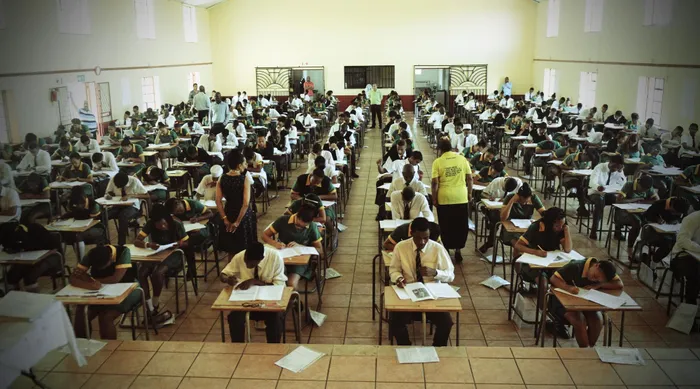
The Department of Basic Education says over 900,000 candidates are registered to write the Grade 12 NSC examinations.
Image: Independent Newspapers Archives
Minister of Basic Education, Siviwe Gwarube says various steps have been taken to ensure the integrity of the matric examinations which began on Tuesday including careful monitoring of exam paper distribution and secured printing sites.
Gwarube said 903,561 candidates are registered to write this year's 2025 National Senior Certificate (NSC) Examination.
There are 766,543 full-time candidates—the highest number since public examinations began in 1996—and 137,018 part-time candidates.
“A total of 162 question papers have been set and moderated by expert panels and quality-assured by Umalusi. To ensure fairness, papers have been adapted into Braille, large print, and South African Sign Language for learners with disabilities.
“All question papers have been printed and securely distributed. Every truck transporting exam papers is GPS-tracked, every stop authorised, and every stage monitored. Integrity is non-negotiable—it is the cornerstone of public trust in our education system,” said Gwarube.
She said other comprehensive risk management measures have been implemented, including secured and alarmed printing sites, access control, and GPS-tracked distribution vehicles.
Each province has developed contingency plans to mitigate risks such as loadshedding, severe weather, or protest action. Alternative venues and generator capacity have been arranged to ensure no learner is disadvantaged.
Parents have been urged to play their part in providing maximum emotional support to Grade 12 pupils over the exam period.
Political parties, teacher unions, and school governing bodies have called on parents and the community to ensure maximum support for learners without disruptions.
Matakanya Matakanye of the national association of school governing bodies stated, “From day one, parents are reminded to support their children. The SGB has played its part by governing schools. Teachers are ready to see their work pay off, and children are prepared to go. The DBE and all the systems are ready; parents must continue with their work, the country will be proud.”
Basil Manuel of the National Professional Teachers' Organisation of South Africa (NAPTOSA) appealed to all principals, as the custodians of exam centres, to conduct themselves—and the schools under their leadership—with dignity, fairness, and compassion, respecting the human rights of children.
“We salute our teachers across all grades, from the Foundation Phase to Grade 12, for their unwavering dedication and professionalism under increasingly difficult conditions. We understand the extreme pressures and burnout many educators face, yet they continue to give their best for the sake of learners.
“We appeal to parents and communities to ensure that learners have safe and supportive environments in which to study and travel to and from examination venues. Protecting our children’s futures must remain a collective responsibility,” said Manuel.
The South African Democratic Teachers' Union (SADTU) called on all stakeholders in education—parents, communities, transport providers, and government—to offer their utmost support to learners during this critical time. “We appeal to communities to ensure that roads leading to schools are not blockaded as part of community protests, and that school transport services operate smoothly so that learners can arrive safely and on time,” it said.